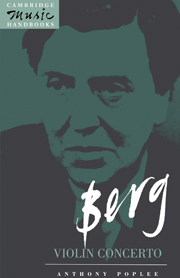3 - Composition and performance history
Published online by Cambridge University Press: 05 June 2012
Summary
By the time Act II of Lulu was finished in mid-September 1933, Berg's affairs had suffered a tragic reverse. The accession of the Nazi party to power in Germany led to a ban on performances of works by the Schoenberg school along with those of many other composers, and Schoenberg himself, as a Jew, was forced to flee from Berlin to America. With the performance of much of the music in its catalogue outlawed in Germany and curtailed by sympathetic developments in Austria, the financial position of Universal Edition was undermined by the loss of income from royalties. They could no longer maintain Berg's monthly stipend at its pre-June level of 1,000 schillings and reduced it in stages to half this amount by the end of the year – a loss made all the more severe by rising inflation. But, since Berg had finished nothing since Der Wein and was already in debit with UE, even this money represented a generous advance against royalties on music whose prospects of performance were growing ever poorer.
In America, Schoenberg – whose own position was perilous – made efforts to raise money for Berg as well as for himself and his family. Berg hoped that a rich patron of the arts, such as Elizabeth Sprague Coolidge, might be interested in sponsoring Lulu, but feared that these plans were unlikely to succeed now that his reputation was no longer maintained by regular performances.
- Type
- Chapter
- Information
- Berg: Violin Concerto , pp. 25 - 46Publisher: Cambridge University PressPrint publication year: 1991

